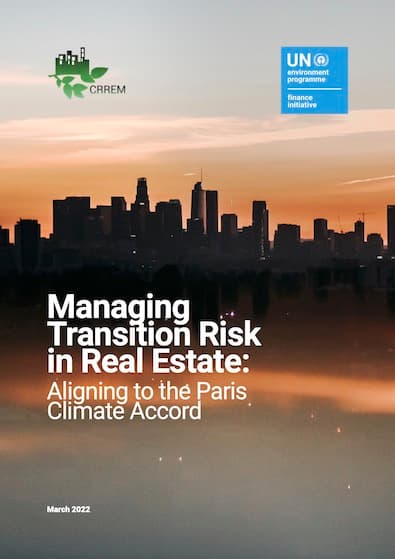AI-Generated Summary
Learn moreContext and Publisher Overview
The report titled "Managing Transition Risk in Real Estate: Aligning to the Paris Climate Acc" has been published by the United Nations Environment Programme Finance Initiative (UNEP FI), a leading organization promoting sustainable finance practices globally. UNEP FI works closely with financial institutions to integrate environmental, social, and governance (ESG) factors into their operations. This report was uploaded to their database on April 21, 2022, and is publicly accessible via the provided URL.
Transition Risks in Real Estate
The real estate sector faces significant transition risks as economies strive to decarbonize in alignment with global climate goals, particularly the Paris Agreement. These transition risks arise from regulatory changes, market shifts, and evolving consumer preferences that can affect the value and viability of real estate assets. To effectively manage these risks, financial institutions engaged in real estate must adopt a proactive approach.
Assessment of Real Estate Assets
This report evaluates the current state of real estate assets and the challenges these properties encounter in achieving net-zero emissions. By identifying the climate-related obstacles within the sector, the report serves as a critical resource for investors and banks looking to navigate the complexities of sustainable investments in real estate.
The Role of the CRREM Tool
To develop the report, UNEP FI collaborated with a dozen real estate investors and banks to pilot the Carbon Risk Real Estate Monitor (CRREM) tool. This initiative was part of UNEP FI’s Task Force on Climate-related Financial Disclosures (TCFD) program. The CRREM tool is designed to measure and manage transition risks effectively, providing financial institutions with actionable insights.
Opportunities and Risks
The findings from this collaborative project highlight both opportunities and risks for financial institutions investing in real estate assets. By utilizing the CRREM tool, institutions can better understand potential transition risks, allowing them to make informed decisions that align with sustainability goals.
Ongoing Efforts and Future Directions
This project builds on the foundational work of UNEP FI’s Property Working Group, now convened by the Principles for Responsible Investment (PRI). The report underscores the importance of continuous engagement and collaboration among stakeholders to ensure that the real estate sector can meet the challenges of climate change while contributing to a sustainable future.
For further insights and details on the findings, readers are encouraged to explore the full report available through the UNEP FI website.
